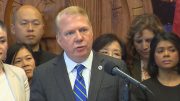It took just minutes for the first lawsuit to be announced last week after the Trump administration said it was rolling back Obamacare’s contraceptive coverage mandate, creating an exemption for faith-based organizations that said paying for employees’ birth control violated their faiths.
The American Civil Liberties Union accused President Trump of discrimination by allowing employers to put religious beliefs before the needs of female workers who had come to expect birth control coverage as part of their health care benefits.
Massachusetts Attorney General Maura Healey said she would go to court in Boston “as soon as possible” to try to block the rule, announced Friday.
“The Trump administration is forcing women to pay for their boss’ religious beliefs,” ACLU senior staff attorney Brigitte Amiri said. “We’re filing this lawsuit because the federal government cannot authorize discrimination against women in the name of religion or otherwise.”
It’s the mirror image of the backlash against President Obama in 2012, when his administration decided that birth control was part of mandatory coverage under the 2010 Affordable Care Act. The law pushed employers to pay for plans covering 18 types of contraceptives, including birth control pills and the morning-after pill.
Mr. Obama granted full exemptions to houses of worship and certain grandfathered employers but initially sought to make all others — including religiously affiliated nonprofits such as Catholic convents and colleges — abide by the mandate.
Years of legal battles produced more exemptions, but the Trump administration’s move cuts through all of them by giving any organization with a sincerely held religious or moral objection to contraception an exemption from the mandate so long as they notify their employees of the change. Publicly traded companies must pinpoint a religious objection to claim an exemption.
The new rule says mandating companies to pay for coverage regardless of their objections does not satisfy a “compelling governmental interest.”
The Health and Human Services Department said it wanted to fulfill Mr. Trump’s pledge to protect religious liberties and mollify about 200 employers who sued the Obama administration or formally objected to the rules.
“The Trump administration has developed a common-sense rule to avoid a needless fight,” House Speaker Paul D. Ryan, Wisconsin Republican, said in praising the decision. “The conscience protections installed will ensure that people and organizations can freely live out their religious convictions and moral beliefs.”
The Becket Fund for Religious Liberty, which fought Mr. Obama in court, said Mr. Trump’s decision is an admission by the government that the previous administration was wrong. That should help settle cases brought by challengers such as Little Sisters of the Poor, a group of Catholic nuns.
Yet pro-mandate groups are refilling the docket with cases challenging Mr. Trump’s move.
Democrats also said they will try to force votes in Congress, reinvigorating spats over women’s health care after Republicans shelved plans to repeal the Affordable Care Act.
“While we expect that this latest dangerous action from the White House will be challenged and defeated in the courts, Democrats will fight with all our strength to defend every woman’s right to comprehensive health care, including contraception coverage,” said House Minority Leader Nancy Pelosi, California Democrat.
Beyond the ACLU, the Center for Reproductive Rights and the National Women’s Law Center threatened legal action, saying the changes will leave “countless” women without access to birth control.
The Trump administration disputed those doomsday predictions. Citing the relatively limited pool of entities that sued the Obama administration, it argued that 99.9 percent of women will not be affected.
Congress, in passing Obamacare, did not mandate contraceptive coverage. Instead, it allowed the administration to make those decisions.
Five years ago, the Obama administration finalized a broad list of contraceptives that it said were required to be paid for without any cost to women, including sterilization, contraceptive shots or implants, the female condom, and emergency contraception known as the morning-after pill.
The Health and Human Services Department said many opponents of the mandate were willing to cover common forms of contraception — just not emergency pills they equated with abortion — and that federal, state and local programs “provide free or subsidized contraceptives for low-income women.”
The department also suggested that mandating the coverage could promote risky sexual behavior among teenagers and young adults.
The American College of Physicians objected to the changes, saying contraception has proven health benefits for women.
“We are concerned that allowing employers to carve out exemptions to the ACA’s requirements that health insurance plans cover evidence-based preventive services without cost-sharing, including but not necessarily limited to contraception, will create substantial barriers to patients receiving appropriate medical care as recommended by their physicians,” American College of Physicians President Jack Ende said.
For more information, please visit www.washingtontimes.com.
Source: www.washingtontimes.com





Be the first to comment on "Donald Trump’s Contraceptive Coverage Rollback Sparks ACLU Lawsuit"